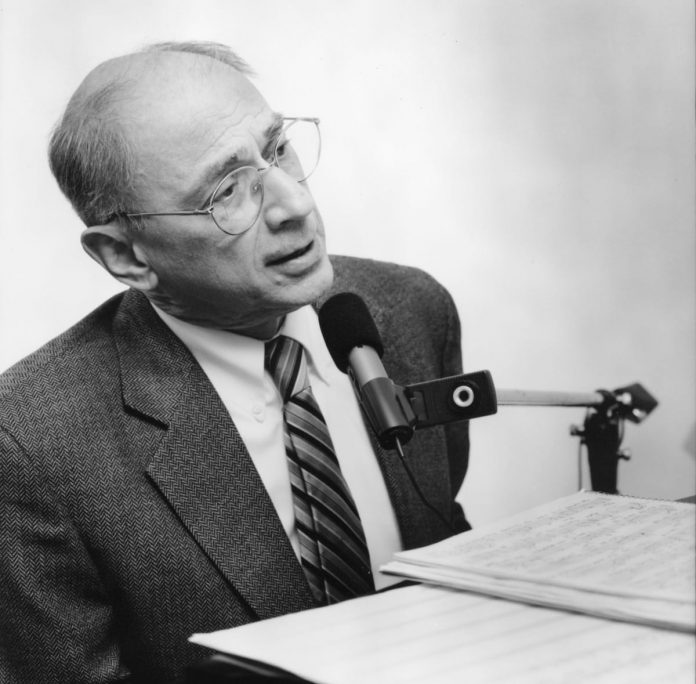The title of Dave Frishberg’s autobiography My Dear Departed Past tells you nearly everything you need to know about the pianist-composer, because like many of us of a certain age he is heavily into nostalgia. Sport, especially baseball is one of his passions and wistful memories about former ball-players are often sentimentally described in his compositions. The tour de force Van Lingle Mungo, for instance, is a hymn not only to Mungo (a Brooklyn Dodgers pitcher from 1931 to 1945) but also to the 36 former players cleverly name-checked in the lyric.
Other baseball-themed songs over the years have included The Sports Page, Play Ball, Dodger Blue and Matty. He wrote Dodger Blue in 1977 to celebrate the Dodgers’ 20th anniversary in Los Angeles and Sue Raney sang it at the ball-park. On his 2005 Jazz Bakery recording Retromania he points out that the Dodgers had spent more time in Los Angeles than they did in Brooklyn. Matty is a deeply felt tribute to Christy Mathewson who spent 17 years as a pitcher with the New York Giants.
Some of his songs, such as Sweet Kentucky Ham, One Horse Town and The Dear Departed Past, have an innocent, almost Norman Rockwell-like vein of Americana in their evocative descriptions of small-town life. A world too that Hoagy Carmichael, Willard Robison and Johnny Mercer often returned to over the years. He is probably better known for more sophisticated material, including Peel Me A Grape, My Attorney Bernie and I’m Hip (a collaboration with his friend Bob Dorough), which have been recorded by Anita O’Day, Meredith d’Ambrosio, Cleo Laine, Mel Tormé, Blossom Dearie, Shirley Horn, Diana Krall and many others. He told Randy Smith that he particularly liked the way Blossom Dearie performed his compositions because of her relaxed, understated delivery.
It should always be remembered that Frishberg’s songs were conceived as personal vehicles. In an interview with Monk Rowe he readily admitted “when I write it’s for the limitations of my vocal ability because (the melodies) are not designed to project virtuosity”. (His voice is an acquired taste but it’s one I acquired a long time ago). Back in the 60s, before his songwriting genius had been acknowledged, he had served a 10-year apprenticeship on the Manhattan jazz scene as one of the house pianists (along with Roger Kellaway and Ross Tompkins) at the celebrated Half Note – “the hippest place in town”.
He was born in St. Paul, Minnesota on 23 March 1933 and during WW2 he listened to his older brother’s record collection, which included sides by Benny Goodman, Artie Shaw, Cab Calloway, Count Basie, Bing Crosby, Ella Fitzgerald and Mildred Bailey. He also developed a lifelong love of Gilbert and Sullivan and even at a young age he was able to sing most of the Mikado from memory.
Pianists were particularly important because he was beginning to learn the instrument and was exposed to Art Tatum, Teddy Wilson and Mel Powell together with earlier maestros like Albert Ammons, Pete Johnson and Meade Lux Lewis. When his piano teacher introduced him to Charlie Parker and Dizzy Gillespie he “fell under the spell of bebop”. He began sitting in occasionally at local clubs when visiting stars like Charlie Ventura, Conte Candoli or Serge Chaloff came to town.
After he graduated from the University of Minnesota the federal government claimed him for the next two years. These were spent at an airforce base in Salt Lake City, Utah. Completing his military service in 1957, he packed his records, books and clothes into a Chevrolet Bel Air and drove cross-country to the Mecca of jazz – New York City. Obtaining a day-job at one of the city’s premier radio stations he wrote continuity material for use between the shows on WNEW. He then began life as a full-time musician, performing six nights a week in a piano bar from nine to two for $75 a week. He was invited to audition for Kai Winding’s four-trombone group at Nola’s Studio and over dinner at Charlie’s Tavern Kai told him he had the job which was a six-week tour of the south.
Getting back to the city he worked at the (in)famous Page Three club in Greenwich Village, which was about a block away from the Village Vanguard. It was apparently a museum of sexual lifestyles that provided continual entertainment from 9 p.m. to 4 a.m. Tiny Tim, who was just starting out, appeared occasionally. There were some fringe benefits at the club, and one of them was backing Sheila Jordan, but Frishberg soon decided to move on. Apparently Cecil Taylor became one of his replacements but he only lasted for one night and history does not reveal if Tiny Tim was on the bill at the time. A little later Blossom Dearie introduced Dave to Bob Dorough and they began work on their first collaboration – I’m Hip – with Frishberg’s lyrics (which came first) and Dorough’s music.
He began playing with Bud Freeman at Eddie Condon’s club and bassist Steve Swallow thought he was “a wonderful jazz player with a hot style all his own. He could join a three-horn ensemble and instantly fake a perfect fourth part”. He worked with Dick Haymes and had an unhappy time with Anita O’Day, saying: “Be wary of scat singers and don’t encourage them.” She did, however, put Peel Me A Grape on the map with her 1962 Time For Two album with Cal Tjader. During one of her engagements in the mid-60s at the Half Note, Judy Garland visited the club and Anita asked her to sit in. It went so well that Ms Garland asked Frishberg to become her musical director. She wanted him to join her on an upcoming trip to England but it was clear that she was really unwell so the pianist turned her down.
See part two of this article
















